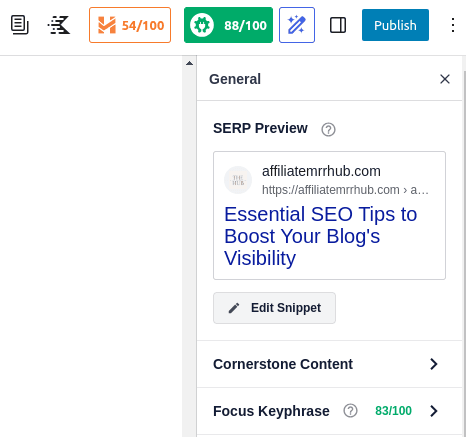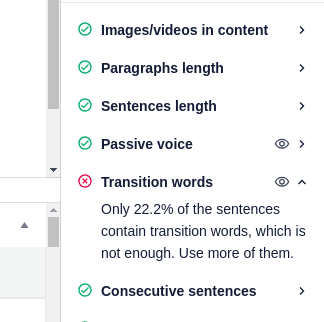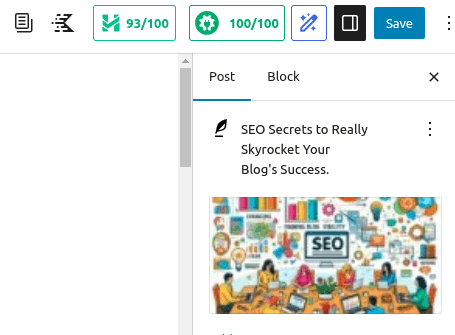The Big Picture: Why SEO Deserves Your Attention

OK, let’s be real—just writing great content isn’t enough to get noticed online anymore. Because the internet is a crowded place, if you want people to find your blog, Search Engine Optimization (SEO) is not only your best friend, but essential. You should always think of SEO as the bridge that connects your blog to the audience you’re trying to reach. Therefore without it, even your best posts might end up gathering dust in the far corners of the internet, which is the last thing you want.
So, in this post, I’ll walk you through why SEO is so important and share tips to help your blog shine on search engines like Google.
What is SEO And Why Should We Care?
SEO is all about making your blog easy to find. You see, all search engines like Google use algorithms to decide what shows up when someone searches for something. Therefore, if your blog post isn’t optimised, it will end up buried beneath a mountain of other content.
So, here’s why good SEO matters:
Visibility: Remember that higher rankings mean more people are likely to click on your blog.
Credibility: Readers will always trust top-ranking posts more—they assume they’re high quality.
Engagement: If you attract the right audience, you’re more likely to keep them hooked.
The Magic of Keywords
Keywords are always the heart and soul of SEO. These are the words and phrases people type into search bars when they’re looking for answers.
Here’s how to nail your keyword strategy:
Do your homework with tools like Google Keyword Planner or Ubersuggest.
Use a mix of main keywords (the focus of your post) and long-tail keywords (specific phrases that reflect user intent).
Sprinkle keywords naturally throughout your post—in the title, headers, meta description, and even in image alt text.
Create Content That People (and Google) Love
Google’s top priority is giving users valuable content, so your focus should always be on quality. Here’s how to make your posts stand out:
Think about how you search for content and remember to answer real questions your readers are asking.
Break up your content with clear headings, bullet points, and short paragraphs for easy reading.
Share practical advice and fresh insights—something readers can’t get anywhere else.
Fine-Tuning the Details: On-Page SEO
It’s all in the details! On-page SEO involves optimising individual elements of your blog post. Here’s what to pay attention to:
Catchy Titles: Include your main keyword and make it irresistible to click.
Meta Descriptions: A brief, intriguing summary that convinces people to read your post.
Internal and External Links: Guide readers to related content on your site and link to credible external sources.
Image Optimisation: Compress images for faster loading and use descriptive alt text.
Make It Fast and Mobile-Friendly
Did you know, most people browse the web on their phones, so your blog needs to look great on smaller screens. Also, no one likes waiting around for slow pages to load. Therefore, we use tools like Google Page Speed Insights to make sure your site is speedy and responsive.
Back links: The Secret Sauce
What are Back links? They are links from other websites to yours, and they’re a big deal in the world of SEO. The more high-quality back links you have, the more trustworthy your blog appears to search engines.
You should focus on creating shareable, link-worthy content, and consider contributing guest posts to reputable sites in your niche. You can start with social media. Where applicable, share your post on your own social media sites, and remember to include the back link when you share. You can use Facebook, LinkedIn, Pinterest, other Facebook groups, X (Twitter), although as I write this it is currently down. I think Elon has upset too many people with DOGE.
The Bottom Line: SEO Is an Ongoing Journey
Actually, SEO isn’t something you do once and forget about—it’s a constant process. Always, keep on learning, experimenting, and optimising your content, and you’ll gradually see your blog climb the search rankings. And also remember, the goal isn’t just to get clicks; it’s to connect with the right audience and create value for them.

We use AIOSEO on this site. It’s currently scoring this page as 85/100. I need to add some transitional words, and images. At the moment, the focus keyword isn’t in the URL (it will be when I hit publish) and currently I have no internal or external links. But, by the time I hit publish, these will have been added along with images. You see, with AIOSEO, I can follow the scoring in real time and adjust where needed.
I’ve now added this image with alt text including my focus keyword. You will see, the headline score is poor, so I will change that before I publish as well. I’ve also added a link to AIOSEO which helps. This is not currently an affiliate link (I’m working on that).
Quality and Structure is so Important.
In modern SEO, what Google wants is quality, good structure and uniqueness. They always focus on the user experience, and also remember, if you want to use AI, that’s fine, but please re-write and make it yours.
Include main points of your post at the top. This gives the reader a reason to stay on the page. Include bullet points, images and videos. For example, at this point in writing I only have 22.2% of sentences with transitional words. I know that because AIOSEO is scoring in real time. Therefore, my next job is to correct this just by going over the text and adding some transitional words.
In the pro version, just click on the eye symbol and it will highlight the areas needing improvement.
I really hope this has given you a better understanding on how good SEO can really make a difference.


As a real example, now that I’ve tweaked the content, included all of the correct links etc, this is the final SEO score. The Meta description is the correct length, the keyword etc score well. Also the writing style looks fine.
The best I could get the title to is 93%, which is a good score, so if you’re reading this, it’s worked.
